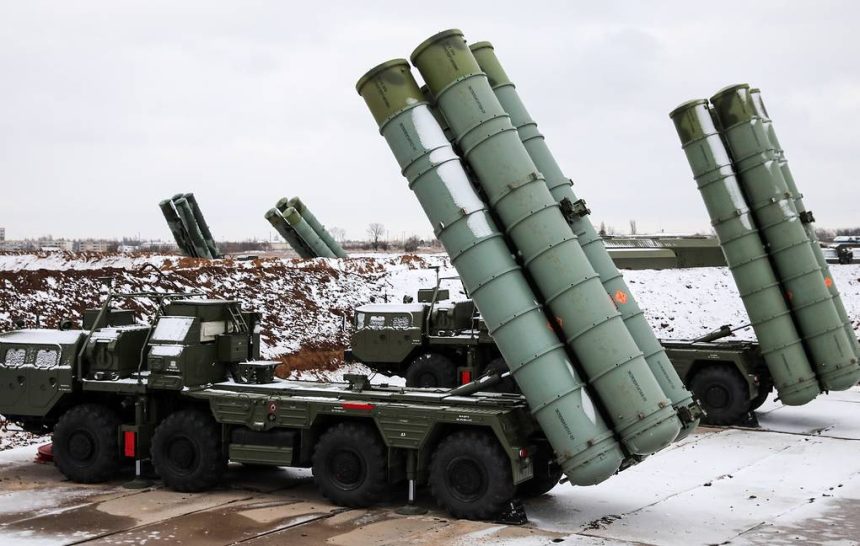“Give Us F-35s And Patriots Without Preconditions”. Turkey’s Communications Director responds to “informal proposals” of giving the S-400 to Ukraine in exchange for reinstating Ankara in the F-35 program and lifting sanctions.
In an op-ed published by the Wall Street Journal on March 18. 2022 (“Turkey’s Russian Missiles Could Defend Ukraine”), Paul Kolbe, former director of the CIA, said that Turkey should send its Russian S-400 air defense systems to Ukraine, a move that would both address Ukraine’s urgent need for more air defense systems and “repair the relationship between the U.S. and Turkey”, paving the way for the sale of U.S. Patriot batteries to Turkey and the reversal of the suspension of Ankara from the F-35 program.
The following day, citing three sources familiar with the matter, an article by Reuters said that the United States had informally raised with Turkey the “unlikely possibility” of sending its Russian-made S-400 Triumf (NATO designation SA-21 Growler) missile defense systems to Ukraine to help it fight invading Russian forces. “U.S. officials have floated the suggestion over the past month with their Turkish counterparts but no specific or formal request was made, the sources told Reuters. They said it also came up briefly during Deputy Secretary of State Wendy Sherman’s visit to Turkey earlier this month,” the report said.
The creative idea of “exchanging S-400s for F-35s”, comes in the wake of Ukrainian President Volodymyr Zelenskiy’s plea to help protect Ukraine’s skies that has seen Biden administration in talks with several allies to provide long range air defense systems such as the S-300s.
During Mar. 21 Press Briefing, Pentagon Press Secretary John F. Kirby responding on a direct question about the DoD being in talks with Turkey on the S-400s, said: “Look on the S-300s, the S-400 rumor that I saw in the press, I would just tell you that our focus is on working with Allies and partners to help get into Ukrainian hands additional systems that they know how to use, that they operate, that they’re trained on. And that they can put to ready use. I think I just leave it at that.” More in general, responding to questions about Slovakia’s S-300: “These are ongoing discussions that we’re having, not only with that nation, but many others about how to provide Ukraine, the kinds of defensive capabilities. To include long range air defense, that we know that they’re comfortable using, they’re trained on, that they already have in their inventory, and whether that can be bolstered. So, these are active consultation. I don’t have any specific arrangements to speak to today that the United States is involved in, but we are obviously actively involved in those conversations going forward.”
Two days later came the first official statements from the Turkish side. The first to talk on records was Ismail Demir, head of the Turkish Defense Industry Directorate (SSB). “This is not a subject of discussion for us. We discussed this issue in the past and now we just continue [cooperation with the Russian Federation],” Demir said in an interview to the Russian Izvestiya newspaper. “Turkey is able to determine its own policy and path, it has always been so.”
“I see no reason why Turkey should abandon our S-400s and hand them over to Ukraine. Why do they need it? These complexes work for them, these are reliable systems , better than Patriot. I don’t think Turkey will follow America’s lead,” said Aleksey Chepa, First Deputy Chairman of the State Duma Committee on International Affairs.
Along with technical or contractual reasons (the S-400 sales agreement states that missiles cannot be given to a third country), there’s one main issue that must be taken into consideration: thus far, unlike most of NATO and Western nations, Turkey has not imposed sanctions on Russia trying to keep a sort of “neutrality” (for instance, it’s worth remembering that Turkish Airlines is one of the two airlines in Europe that continue to have regular flights with Moscow or St. Petersburg), focusing on facilitating negotiations for a ceasefire. Although the situation is quite dynamic and may change in the next days, at the moment it seems unlikely that the Turkish will accept sending their brand new S-400s to Ukraine, as the transfer would almost certainly cause a crisis with Russia and affect the relationship between Moscow and Ankara.
On Mar. 23, Erdogan’s communications chief, Fahrettin Altun, responded to the op-ed in the Wall Street Journal with an opinion piece on the WSJ: “Though quite unrealistic today, this idea presents an opportunity to discuss the problems Turkey has experienced lately with the West” he said.
Altun recalled Ankara’s path to buy Russian-made missiles, saying that Turkey was the first to approach the US for the procurement of the Patriot system but “Turkiye did not have the choice to buy the Patriot. […] Given that Turkiye is in one of the world’s most dangerous and unstable regions, and the threats Turkiye faced did not magically disappear with Washington’s rejection, Ankara had to look into alternatives.”
Commenting the decision to remove Turkey from the F-35 program following the purchase of the Russian S-400, Altun said: “Turkey’s unlawful ‘removal’ from the F-35 program over political considerations (of which the U.S. has not officially and lawfully notified Turkey) makes it hard to take seriously the metaphorical carrot of Turkiye’s ‘reinstatement”.
“Turkey, which sees European Union membership as a strategic goal and is proud of its NATO membership, expects to receive the treatment it deserves from the West. Confidence-building measures should be taken, not informal proposals, to repair the relationship. “What the West needs to do to develop Mr. Kolbe’s argument is to deliver F-35 warplanes and Patriot batteries to Turkey without preconditions”.
Therefore, using Altun’s words: the transfer appears quite unrealistic today, although we don’t know what could happen in the future.









